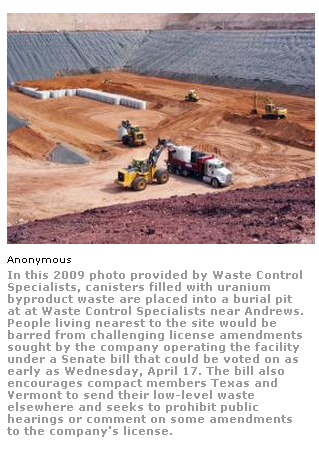Nuke bill raises opposition from environmentalists
April 17, 2013

By BETSY BLANEY
ASSOCIATED PRESS
Lubbock Avalanche-Journal
People living nearest to a radioactive waste dump site in Andrews would be barred from challenging the company operating the facility under a bill opponents say further caters to the business.
Senate Bill 791 also encourages members of a compact, Texas and Vermont, to send their low-level waste elsewhere, allows for the company to take in additional, more radioactive material per year and seeks to prohibit public hearings or comment on some changes to the company’s license.
The bill from Sen. Kel Seliger, R-Amarillo, could be voted on as early as Wednesday, April 17. A similar bill has been filed in the House.
Residents of Eunice, N.M., live less than 10 miles from Dallas-based Waste Control Specialists’ 1,300-acre radioactive waste burial ground. Under the bill, they would no longer be able to claim to Texas licensing officials their well-being is affected by the dump. The bill allows for challenges from Texas residents in Andrews County, home to the dump site, and any adjacent Texas county.
Eunice native Rose Gardner has long objected to the dump site, believing that leaks will lead to groundwater contamination. She said she’s long known that someday the company would try to silence her objections.
"There isn’t a Texan living near the state line," the 54-year-old flower shop owner said. "They live 37 miles away in Andrews. And we’re sitting here like little kids playing tiddlywinks."
Company spokesman Chuck McDonald said that part of the bill might not remain. He said Seliger spoke to Sen. Robert Duncan, R-Lubbock, about a proposed amendment.
"I think it’s really a moot point based on the exchange I heard in committee," McDonald said.
A call seeking comment from Seliger was not immediately returned Tuesday, April 16.
The nuclear waste dump site, whose majority owner is billionaire and GOP mega-donor Harold Simmons, accepted its first low-level radioactive waste about a year ago, ending an expensive and yearslong effort by the company to bury materials from medical, research and industrial activities and from nuclear power plants. Also buried there is PCB-tainted sludge dredged from the Hudson River in New York and tons of Cold-War era radioactive waste from a former uranium-processing plant in Ohio.
Environmental groups have opposed the company’s continual pressing for various types of waste to bury in the remote scrub brush terrain about 375 miles west of Dallas.
"It’s just always something more and I have to wonder where this will end," said Karen Hadden, executive director of the Texas SEED Coalition.
Originally the site was to handle low-level waste from compact states, but last legislative session lawmakers approved allowing waste from more than three dozen states to be buried at the facility.
Seliger’s bill also seeks to promote sending low-level waste, known as Class A, out of Texas for burial and ups the annual radiation limit for the next two years from 220,000 to 300,000 curies so that states outside the compact can dispose of hotter waste, known as Class B and C.
The company, Andrews County and the state stand to make more money from the hotter waste. The county receives 5 percent and the state 25 percent of the company’s revenues quarterly.
Lawmakers should play an active role in regulating any future plans by the company to expand the site’s capacity and any change in its license, including the forms, types or streams of waste, Duncan said.
"The Legislature should impose limits on volume and radioactivity in that site," he said. "If those need to be changed later on those limits should be changed through the legislative process."
The bill includes prohibiting public comment or hearings on minor amendments to the license, which is regulated by the Texas Commission on Environmental Quality. The bill defines minor as "a change in the type, volume or concentration limits of wastes to be received to the extent the change does not increase the total volume and curie capacities approved" in the existing license.
McDonald said the license is valid and operations are underway, making the commission the agency to handle regulation.
"They should be the ones to determine if the waste stream meets the waste acceptance criteria," he said. "It’s taking place safely and securely and TCEQ needs the ability to manage it."
That’s not the view of Marisa Perales, an attorney representing the Lone Star Chapter of the Sierra Club in a contested case hearing that a judge last year ruled should have occurred. Waste Control is appealing that ruling.
"It seems to me that what’s occurring is that TCEQ, WCS, the legislature are trying more and more to keep the public out of the process," she said.
This document contains copyrighted material whose use has not been specifically authorized by the copyright owner. SEED Coalition is making this article available in our efforts to advance understanding of ecological sustainability, human rights, economic democracy and social justice issues. We believe that this constitutes a "fair use" of the copyrighted material as provided for in section 107 of the US Copyright Law. If you wish to use this copyrighted material for purposes of your own that go beyond "fair use", you must obtain permission from the copyright owner.


